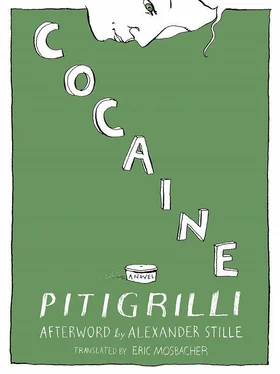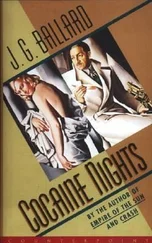Tito and his friend went into the next room as if they were entering a waxwork show restricted to men over the age of eighteen.
Their arrival was greeted with a certain mistrust. A stagnant, yellowish light shone down on a number of small tables covered with green baize of the kind used for card tables and university exams. The room was not a big one; there was a big divan that went all round it, eight small tables, a piano, some newspapers dirtied by drink and finger marks, and a mirror that had been scratched with a diamond.
Tito scrutinized the room before observing the people in it; natural curiosity should have made him do the opposite but, to avoid rousing unjustified suspicions and to create the impression of being already initiated into the mysteries of drugs, he took his seat on the divan next to his friend in an offhand and casual manner.
Then he picked up a newspaper.
Three women looked at him suspiciously and mumbled something inaudible. But the girl who had laughed noisily at his remark in the other room a short time before turned to the others and, nodding in his direction, said : “Pas bête le type.”
Tito observed the four women one by one. He noticed that their dresses were made of good materials, but were old, worn and neglected; the white of the organdy was yellowed, the leather trimmings were cracked, the silk was split, the belt twisted, the shoes not worn out but misshapen as a result of careless walking. One of the women had not properly washed her neck and her polished fingernails offered a repulsive contrast of red enamel and black filth.
They huddled together side by side like birds in a cage as if to keep themselves warm. Three of them rested their feet on the horizontal metal bar under the table; the fourth had her heels on the edge of the seat with her calves up against her thighs like a closed jack-knife, and rested her chin on her knees. There was a glassy look in their eyes, and their bloodless but cruelly rouged lips looked unreal against the pallor of their faces.
These four taciturn women (or was their taciturnity the result of the two strangers’ arrival?) seemed to be awaiting sentence by an invisible court that might appear through the curtains at any moment; in fact the least stupefied of them kept looking in that direction, though nothing whatever happened.
Under the big mirror two thin men were mechanically playing dice with the listless indifference of aging clerks working away in a dusty office and being paid a salary, not for the work they did, but for the time they spent. One of them had his coat collar turned up over the silk handkerchief he wore instead of a detachable collar and tie. All Tito could see of the other was his shoulders and the back of his neck. His neglected hair came down over the back of his neck and met in the middle as if to form an embryonic tail. When he turned to have a look at the newcomers, Tito saw his face. It was one of those ugly faces that are to be seen only on days when there’s a general strike: a long, thin face, disfigured by corrosion, and fleshless, like one of those ox-skull ornaments that architects call bucranes.
The woman who had spoken rose and went and said something to one of the two players; she leaned over his shoulder and stroked his ear with her cheek, but he went on playing, unperturbed. She lifted his jacket, took his cigarette case from his trouser pocket and, on her way back to her friends with a lit cigarette, she raised one leg to the level of her shoulders and with defiant roguishness brought it down on the table, making the glasses tinkle.
“Are you enjoying yourself?” she said to Tito, who had not yet said anything. “It’s not very cheerful here.”
“So I see,” he replied. “It’s more cheerful in the morgue.”
The woman was offended. “Why don’t you go there then?” she snarled.
One of the dice players turned and exclaimed: “Christine!”
“They probably take us for two policemen or something of the sort,” Tito’s friend suggested.
Tito laughed, and turned to the least taciturn of the women. “Your friends and the gentlemen playing dice must have formed a strange idea of us,” he said. “I have the impression that you’re all a trifle embarrassed. But we’re not what you suppose. I’m a journalist, and this is a colleague of mine. There’s nothing to be afraid of, as you can see.”
“Journalist?” one of the three silent women said. “And what are you doing here?”
“What one usually does in a café.”
“But why did you pick this place instead of a café on the grand boulevards where you can watch the grues and the trottins passing by?”
“Because this is more useful for what I’m looking for.”
“And what are you looking for, if I may ask?”
“Cocaine!”
The two men stopped their game and went over to Tito. One of them sat astride a chair with his chest against the back. He took a small silver box from his waistcoat pocket, opened it, and offered it to Tito.
The four women rushed at him.
“Ah, canaille!”
“ Vilain monstre!”
“ Sale bête. ”
“Selfish swine!”
“And he said he had none left.”
“And he was letting us die for lack of it.”
One of the women tried to seize some of the contents of the box between her thumb and forefinger, but the man pushed her away with the flat of his hand, telling her roughly to keep her hands off.
But the four harpies didn’t calm down. Panting, with dilated nostrils and flashing eyes, they clawed at the box of white powder, like shipwrecked persons struggling for a place in the lifeboat. Those four bodies round a little metal box, all in the grip of the same addiction, looked like four independent parts of a single monster greedily writhing round a small, mysterious prize, elevating its cheap pharmaceutical crudity to the dignity of a symbol. All Tito could see was half-clenched hands that looked numbed by pain, hands with pale, bony, hooked fingers that turned into tightly clenched fists with nails sticking into palms to suffocate a shriek, or quell a craving, or give pain a different form, or localize it elsewhere.
The hands of cocaine addicts are unforgettable. They seem to live a life of their own, to be getting ready to die before the rest of the body, to be always on the point of a convulsion that is just, but only just, being held at bay.
In their eyes, now enlivened by the agony of anticipation, now dulled by the terrible depression caused by absence of the drug, there is a sinister light, a suggestion of death or dying, while their nostrils are horribly dilated as if to sniff any possible stray molecules of cocaine that might be dispersed in the air.
Before Tito had a chance to help himself the four women succeeded in dipping the fingers of one hand in the box, and then, carefully holding the other hand underneath as a plate, made off to the other end of the room, like a dog making for a distant corner with a stolen bone.
While holding the precious powder to their dilated nostrils and breathing it in, they kept looking round them mistrustfully.
Misers whose meanness borders on insanity, women whose greed for jewels verges on frenzy, do not worship their treasures as cocaine addicts worship their powder. To them there is something sacred about that white, glittering, rather bitter substance; they call it by the most loving and tender names, and talk to it as we talk to a loved one whom we have regained after thinking her lost forever. To them the drug box is like a sacred relic; they think it worthy of a monstrance, an altar, a small temple. They put it on the bedside table, look at it, talk to it, caress it, hold it to their cheek, press it to their throat or their heart.
Читать дальше



